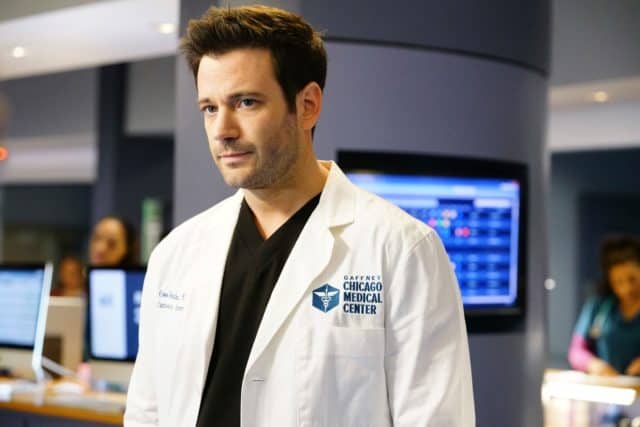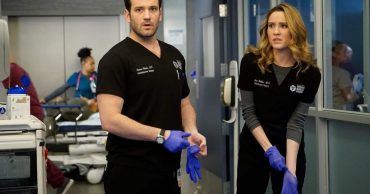
There is a reason there are systems upon systems in place to keep doctors focused on facts instead of emotions. If they led patient care with their hearts instead of the rules, every patient’s health care decisions could be made at the expense of another’s. Facts and protocols are put in place to avoid these kinds of entanglements. But what happens when you lead with your heart and not with your head? For Chicago Med, it literally is the difference between life and death.
Both Dr. Rhodes and Dr. Bekker have patients waiting for hearts on the transplant list. Dr. Bekker’s patient is as high on the transplant list as a person can get, and is already functioning on an artificial heart. Dr. Rhodes’s patient was lucky his nearly fatal heart condition was caught, but no treatment has worked thus far. When a viable organ donor comes in with a matching blood type for both patients, it’s the ultimate judgement call. Obviously both doctors want the heart for their own patients. This is why there is a strict set of rules set up for organ disbursement. But Dr. Rhodes doesn’t want his patient to wait for a heart that may never come, so he skips a few steps to get his patient ahead of the line. Needless to say, Bekker is not happy. She goes to Ms. Goodwin to set things right, and is looked at very harshly by Rhodes for choosing fact over emotion in this case. Here’s a fact he probably should have thought about. His patient had antibodies that would have compromised the donor heart. The heart would have failed, and both patients would be dead. So what does Rhodes do? He fixes the antibody levels so his patient will get the heart. Saving a life is always a good thing, but if the next patient dies because of what Rhodes did, he better be prepared to live with those consequences too.
Dr. Charles knows all too well of fact and consequence. Dr. Charles happens to be the lead psychiatrist on the committee of organ disbursement. This includes a spot for Dr. Reese’s father. I wish that I could call Dr. Reese naive, but she’s a smart cookie. She’s literally being manipulated by her estranged father, who was recently confirmed with antisocial personality disorder. He can’t stop manipulating her. Lie after lie she believes, because she wants to believe it. She wants to believe her long-lost father has come to make amends, when really he is just sinking her into a hole. When he finds out that Dr. Charles is on the committee, he goes on the attack. He manipulates Reese into thinking that Dr. Charles is jealous of their relationship. It’s completely preposterous, but it forces Dr. Charles to lay out some harsh clinical facts. Once Dr. Reese starts thinking like a doctor instead of a daughter, she begins to realize just how right Dr. Charles is.
There comes a point where the energy you put into something doesn’t get the returns you hoped for. For Dr. Manning’s patient and his family, they have reached that point. The patient’s mother has been burnt out caring for her son, who is stuck in a vegetative state after a terrible accident. But she’s not just physically exhausted, she’s emotionally worn out. She believes her son is tired of this endless existence, and so she stops taking care of him. She wants him to go in peace, and Dr. Manning understands why she would. Dr. Halstead does not, and calls the police. But by the time they get there, the family has made a collective decision to let the boy go. In Halstead vs. Manning on this matter, both had good points, and which one you agree with has more to do with clear-cut rules vs. emotion than any other case. Something has me wondering if Dr. Halstead hasn’t just been been burning the candle at both ends, because his reaction wasn’t 100% believable.
Here’s the flip side about rules: there are some things that they can’t possibly predict. The rules of what is standard, ordinary, and expected of patients a certain age do not always work out. In a world governed only by rules of the typical, Dr. Choi’s healthy young patient should not have had a rare stroke caused by an even rarer condition in her brain. But she did, even though everyone jumped to the conclusion that she was doing drugs. In a world governed by these same rules, a healthy 55-year old woman could do a lot of things, but should not have been able to get pregnant, let alone give birth to a healthy baby girl without any warning. This particular episode of “I Didn’t Know I Was Pregnant” is one I understand. Those are surprises you just can’t predict, and they make for interesting conversation at April and Noah’s family party. Much like Dr. Choi bringing his estranged sister to said party, seeing Choi dance in public was a miracle we were more than happy to witness.
Which case of rules vs. emotions did you side with?
 Follow Us
Follow Us





